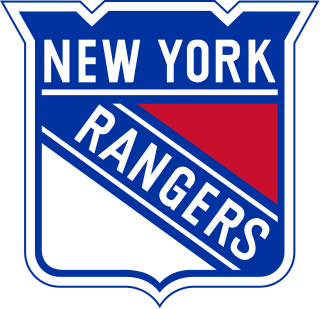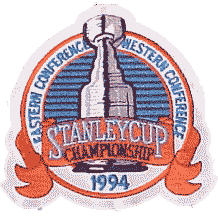Related Research Articles

The New York Rangers are a professional ice hockey team based in New York City. The Rangers compete in the National Hockey League (NHL) as a member of the Metropolitan Division in the Eastern Conference. The team plays its home games at Madison Square Garden, an arena they share with the New York Knicks of the National Basketball Association (NBA). They are one of three NHL franchises located in the New York metropolitan area; the others being the New Jersey Devils and New York Islanders.

Mark John Douglas Messier is a Canadian former professional ice hockey centre. His playing career in the National Hockey League (NHL) lasted 25 years (1979–2004) with the Edmonton Oilers, New York Rangers, and Vancouver Canucks. He also played professionally with the World Hockey Association (WHA)'s Indianapolis Racers and Cincinnati Stingers. He also played a short four-game stint in the original Central Hockey League (CHL) with the Houston Apollos in 1979. He was the last WHA player to be active in professional ice hockey, and the last active player in any of the major North American professional sports leagues to have played in the 1970s. After his playing career, he served as special assistant to the president and general manager of the Rangers.

In ice hockey, a goal is scored when the puck entirely crosses the goal line between the two goal posts and below the goal crossbar. A goal awards one point to the team attacking the goal scored upon, regardless of which team the player who actually deflected the puck into the goal belongs to. Typically, a player on the team attempting to score shoots the puck with their stick towards the goal net opening, and a player on the opposing team called a goaltender tries to block the shot to prevent a goal from being scored against their team.
Edward "Ed" Giacomin is a Canadian retired professional ice hockey goaltender who played for the New York Rangers and Detroit Red Wings in the National Hockey League between 1965 and 1978.
The 1927–28 NHL season was the 11th season of the National Hockey League. Ten teams played 44 games each. The New York Rangers won the Stanley Cup beating the Montreal Maroons, becoming the first NHL team based in the United States to win it.
The Curse of 1940, also called Dutton's Curse, was a superstitious explanation for why the National Hockey League (NHL)'s New York Rangers did not win the league's championship trophy, the Stanley Cup, from 1940 through 1994.
Ray Castoldi has been the stadium organist at Madison Square Garden since 1989. During the summer, when the New York Rangers and New York Knicks are spending their offseasons, Castoldi is heard at the organ at New York Mets games at Citi Field on weekends. Because of this, he is the only person to play for the Mets, Rangers and Knicks in the same season.
The history of the New York Rangers hockey team began in 1926 when the National Hockey League (NHL) granted a franchise to Tex Rickard, the founder of the team. The New York Rangers experienced early success, winning the Stanley Cup in only their second season of existence, and would go on to win two more in the next 12 years.

The 1994 Stanley Cup Final was the championship series of the National Hockey League's (NHL) 1993–94 season, and the culmination of the 1994 Stanley Cup playoffs. It was contested between the Eastern Conference champion New York Rangers and Western Conference champion Vancouver Canucks. The Canucks were making the club's second Finals appearance, their first coming during their Cinderella run of 1982, and the Rangers were making their tenth appearance, their first since 1979. The Rangers ended their then record 54-year championship drought with a victory in game seven to claim the long-awaited Stanley Cup. It was the fourth championship in franchise history. The CBC broadcast of the deciding game seven attracted an average Canadian audience of 4.957 million viewers, making it the most watched CBC Sports program in history to that time. This was the last Stanley Cup Final with games played in Canada until 2004, and the last to go the full seven games until 2001.

"I Wanna Be a NY Ranger" is the eighth single by American horror punk band Misfits. It was written by John Cafiero and originally intended to be performed by the Ramones for a promotional campaign for the New York Rangers and Madison Square Garden. However, the Ramones retired in 1996 and Cafiero instead presented the song to the Misfits, who recorded it with Cafiero singing lead vocals. A condensed 30-second version with then-Misfits singer Michale Graves on vocals appeared later that year on the Short Music for Short People compilation.
The 1940 Stanley Cup Finals was a best-of-seven series between the New York Rangers and the Toronto Maple Leafs. New York would win the series 4–2 to win their third Stanley Cup. The Rangers would not win another for 54 years, a circumstance termed the curse of 1940.
The 1993–94 New York Rangers season was the franchise's 68th season. The highlight of the season was winning the Stanley Cup and hosting the NHL All-Star Game at Madison Square Garden. The Rangers clinched their second Presidents' Trophy and sixth division title by finishing with the best record in the NHL at 52–24–8, setting a then-franchise record with 112 points.
The 1978–79 New York Rangers season was the franchise's 53rd season. The highlight of the season was participating in the Stanley Cup Finals, as the Rangers played 12 consecutive playoff games without losing in regulation.
The 1939–40 New York Rangers season was the franchise's 14th season. With new coach Frank Boucher the Rangers finish in 2nd place again with an impressive 27–11–10 record. In the semi-finals the Rangers beat the Boston Bruins in 6 games to advance to the 1940 Stanley Cup Finals. In the finals the Rangers won their first 2 games by scores of 2–1 and 6–2 at the Garden, before finishing the series on the road because of the circus. After dropping the first 2 games in Toronto the Rangers won a critical Game five 2–1 in overtime on Muzz Patrick's overtime goal. In Game 6 it would take overtime again as the Rangers won their 3rd Stanley Cup on Bryan Hextall's goal 2:33 into OT. Following the season the Rangers would celebrate buying out their lease at Madison Square Garden by burning the lease in the historic Stanley Cup, a move that would take on greater mystery in coming years.
The 1928–29 Boston Bruins season was the Bruins' fifth season in the NHL. Boston defended its American Division title, and went on to defeat the New York Rangers in the Final to become the third American-based team to become Stanley Cup champions.
The 1927–28 New York Rangers season was the franchise's second season. In the regular season, the Rangers finished in second place in the American Division with a 19–16–9 record and qualified for the Stanley Cup playoffs. In a pair of two-game total goals series, New York defeated the Pittsburgh Pirates and Boston Bruins to advance to the Stanley Cup Finals, where they faced the Montreal Maroons. The Rangers defeated the Maroons 3–2 to win their first Stanley Cup.

Madison Square Garden was an indoor arena in New York City, the third bearing that name. Built in 1925 and closed in 1968, it was located on the west side of Eighth Avenue between 49th and 50th streets in Manhattan, on the site of the city's trolley-car barns. It was the first Garden that was not located near Madison Square. MSG III was the home of the New York Rangers of the National Hockey League and the New York Knicks of the National Basketball Association, and also hosted numerous boxing matches, the Millrose Games, the National Invitation Tournament, concerts, and other events. In 1968 it was demolished and its role and name passed to the fourth Madison Square Garden, which stands at the site of the original Penn Station. One Worldwide Plaza was built on the arena's former 50th Street location.

The Devils–Rangers rivalry, is an ice hockey rivalry between the New Jersey Devils and the New York Rangers clubs of the National Hockey League (NHL). The two teams are called "cross-river rivals." This is because Madison Square Garden in Midtown Manhattan, where the Rangers play, is across the Hudson River and less than 10 miles (16 km) from the Prudential Center in downtown Newark, the home of the Devils. Travel between both arenas is easily accomplished by both road and rail.

The Islanders–Rangers rivalry, also known as the Battle of New York, is a local sports rivalry between the New York Islanders and New York Rangers of the National Hockey League. Both teams play in New York, with the Rangers in the New York City borough of Manhattan, and the Islanders in the Long Island county of Nassau near its border with Queens. They are two of the three teams that play in the New York metropolitan area, the other being the New Jersey Devils who play in Newark, New Jersey.

Dieter Ruehle is an American musician who is the stadium organist for Major League Baseball's Los Angeles Dodgers and National Hockey League's Los Angeles Kings. As of October 2020, Ruehle has played for three championship teams in three different sports: Dodgers in 2020; Lakers in 2002, 2009 and 2010; and Kings in 2012 and 2014.
References
- 1 2 3 4 5 Wyshynski, Greg (June 10, 2022). "2022 Stanley Cup Playoffs: The stories behind the goal songs for the New York Rangers, Tampa Bay Lightning and Colorado Avalanche". ESPN .
- 1 2 3 Murphy, Bryan (June 1, 2022). "'Slapshot' explained: How the New York Rangers goal song became a staple at Madison Square Garden". Sporting News.
- 1 2 3 4 5 6 7 8 Caldwell, Dave (May 23, 2013). "The Curse of the Rangers' Goal Song". The Wall Street Journal .
- 1 2 Kitchener Rangers Goal , retrieved October 8, 2022
- 1 2 Caldwell, Dave (April 18, 2010). "Songs to accompany an air horn". The Daily Sentinel. The New York Times News Service – via Newspapers.com.